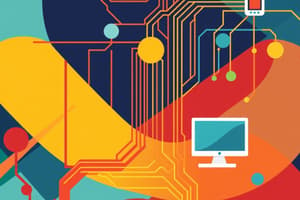Podcast
Questions and Answers
Which of the following benefits is NOT associated with ICT in public administration?
Which of the following benefits is NOT associated with ICT in public administration?
- Economic growth through enhanced productivity
- Increased access to information and education
- Improved public health outcomes (correct)
- Global connectivity and cultural exchange
What is a significant challenge related to the widespread use of ICT?
What is a significant challenge related to the widespread use of ICT?
- Decreased productivity
- Economic stagnation
- Universal access to devices
- Digital divide creating disparities (correct)
How does ICT contribute to technological advancement?
How does ICT contribute to technological advancement?
- By reducing the need for new software
- By promoting traditional methods of communication
- By influencing the development of new devices and networks (correct)
- By limiting innovation in existing industries
What ethical concern can arise from the use of ICT?
What ethical concern can arise from the use of ICT?
Which of the following is a way ICT affects social development?
Which of the following is a way ICT affects social development?
What does ICT primarily encompass?
What does ICT primarily encompass?
Which of the following is NOT a key component of ICT?
Which of the following is NOT a key component of ICT?
How does ICT impact communication?
How does ICT impact communication?
In what way does ICT benefit the education sector?
In what way does ICT benefit the education sector?
What role does ICT play in business?
What role does ICT play in business?
How does ICT support healthcare professionals?
How does ICT support healthcare professionals?
What impact has ICT had on the entertainment industry?
What impact has ICT had on the entertainment industry?
What role does ICT play in governance?
What role does ICT play in governance?
Flashcards
What is ICT?
What is ICT?
ICT encompasses all technologies used for communication, including hardware, software, and networks. It's about storing, processing, exchanging, and retrieving information.
What is Hardware?
What is Hardware?
Hardware refers to the physical components of a computer system, such as the CPU, memory, and keyboard. It's the tangible stuff you can touch.
What is Software?
What is Software?
Software includes the programs and instructions that tell the hardware what to do. It's the invisible set of rules that makes the hardware work.
What are Networks?
What are Networks?
Signup and view all the flashcards
How does ICT impact Communication?
How does ICT impact Communication?
Signup and view all the flashcards
How does ICT impact Education?
How does ICT impact Education?
Signup and view all the flashcards
How does ICT impact Business?
How does ICT impact Business?
Signup and view all the flashcards
How does ICT impact Healthcare?
How does ICT impact Healthcare?
Signup and view all the flashcards
How does ICT affect economic growth?
How does ICT affect economic growth?
Signup and view all the flashcards
How does ICT connect the world?
How does ICT connect the world?
Signup and view all the flashcards
What is the digital divide?
What is the digital divide?
Signup and view all the flashcards
What security concerns arise with ICT?
What security concerns arise with ICT?
Signup and view all the flashcards
What are privacy concerns with ICT?
What are privacy concerns with ICT?
Signup and view all the flashcards
Study Notes
Overview of ICT
- ICT encompasses all forms of communication technology, including hardware, software, and networks.
- It is an umbrella term encompassing various technologies used to process, store, exchange, and retrieve information.
- ICT allows for the rapid dissemination of information across geographical boundaries and promotes efficient communication.
Key Components of ICT
- Hardware: The physical components of a computer system, such as the CPU, memory, storage devices, input/output devices (keyboard, mouse, monitor). Different hardware types are utilized in various applications, reflecting diverse needs for processing speed, storage capacity, and input/output capabilities.
- Software: The programs and instructions that tell the hardware what to do. It includes operating systems, applications, and programming languages. Software allows users to perform specific tasks and manipulate data.
- Networks: Systems that connect multiple devices together, enabling communication and data sharing. Networks range from local area networks (LANs) to wide area networks (WANs), or the internet itself, influencing the accessibility and speed of information transmission.
Applications of ICT
- Communication: ICT facilitates communication via email, instant messaging, video conferences, and social media platforms. This has revolutionized how people connect and share information across distances.
- Education: ICT tools enhance educational experiences through online learning platforms, interactive simulations, and educational software. E-learning has become a prominent way of accessing and disseminating knowledge.
- Business: ICT is integral to modern businesses, supporting productivity through software applications for accounting, data analysis, marketing, and customer service management, and automating tasks. Digital transformation is reshaping traditional business processes.
- Healthcare: ICT aids in patient care through electronic health records, telehealth consultations, medical imaging, and other tools. This empowers healthcare professionals with improved diagnostic capabilities and access to patient data.
- Entertainment: ICT has fundamentally changed the entertainment industry by providing access to music, movies, and games through platforms like online streaming services and video game consoles.
- Governance: ICT promotes efficient and transparent government operations by providing tools for citizen engagement, communication, and service delivery. Digital governance is crucial for modernization and accountability in public administration.
Impact of ICT
- Economic Growth: ICT promotes economic growth by enhancing productivity, creating new jobs, and fostering innovation. Developing economies often leverage ICT to attract foreign investment and boost competitiveness.
- Social Development: ICT promotes access to information and education, enabling social inclusion and empowerment.
- Technological Advancement: ICT fuels ongoing technological advancement by influencing the development of new devices, software, and networks.
- Global Connectivity: ICT facilitates global connectivity, fostering cultural exchange, understanding, and collaboration between individuals and nations worldwide.
- Increased Productivity: ICT fosters workflow optimization and efficiency across various aspects of daily life and industry.
Challenges Associated with ICT
- Digital Divide: Unequal access to ICT and digital literacy can create social and economic disparities, exacerbating existing inequalities.
- Security Concerns: The widespread use of ICT creates vulnerabilities, necessitating robust security measures to protect against cyber threats and data breaches.
- Privacy Issues: Collecting and using personal data raises privacy concerns, prompting regulatory frameworks.
- Ethical Considerations: The use of ICT can raise ethical dilemmas, regarding data manipulation, misinformation, bias, and misuse.
- Sustainability Concerns: The production and use of ICT devices have environmental implications that need to be addressed.
Studying That Suits You
Use AI to generate personalized quizzes and flashcards to suit your learning preferences.




